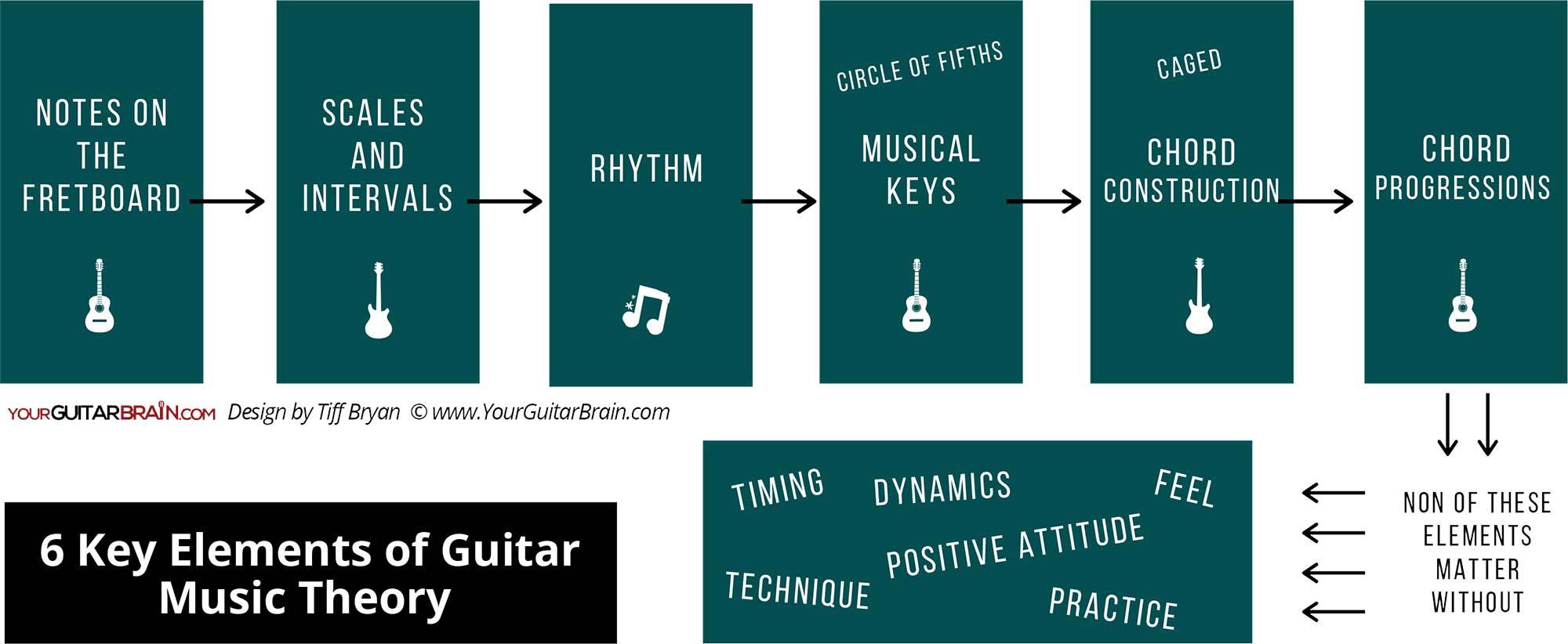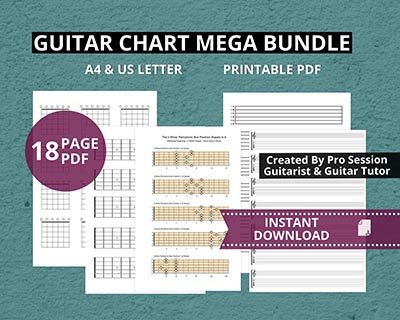Guitarists: Struggling to improve? We reveal the music theory that is the game-changer you need to know.
Do you want to become a better guitarist? Faster? If so, then you need to learn music theory.
You can’t dodge it any longer. Music theory is the language of music, and it can help you understand how to play better, improvise, and write your own songs.
In this blog post, we’re going to share some of the most important music theory secrets for guitarists. These secrets will help you improve your skills quickly and easily.
So if you’re serious about becoming a better guitarist, be sure to read on!
➡️ Are you interested in making the process of learning the guitar more manageable and less aggravating? Deep dive on all the music theory basics covered in this post in my popular book Easy Peasy Guitar Music Theory: for Beginners.
What is music theory?
Music theory is the universal language of music. It’ll help you see how everything you play on guitar is connected. Chords, melodies, riffs, scales, everything!
It’ll give you the tools you need to understand and communicate everything about music to yourself and others.
Whether you’re playing the guitar just for fun or if you’re a serious gigging guitarist, learning music theory is your secret weapon.
More than that, it’s your new superpower. Being switched on about even the most basic elements of music theory will help you feel like you’re improving because you’ll understand what to do to get where you want to go.
Bliss!
If I had to reduce guitar music theory down to six key areas every guitar player should learn, they are:
Music Theory Secret #1: Notes On The Fretboard
Learning the notes on the guitar fretboard is not only essential for reading music, but also for understanding how everything is interconnected.
You will be able to see patterns, shapes, and relationships between notes, chords, and scales.
This will make it easier for you to navigate your way around the fretboard, learn songs, and improvise.
Music Theory Secret #2: Scales
Scales are the foundation of music. They are collections of notes that sound good together and create melodies and harmonies.
From the Chromatic scale to the Major scale, you should know the different types of scales and how they are constructed.
You will also learn how scales relate to modes, keys, and chords.
Music Theory Secret #3: Intervals
Intervals are the distances between two notes. They are the backbone of everything you play on guitar.
To avoid hitting a brick wall on the guitar, you must understand scale interval formulas and chord interval formulas (aka how chords and scales are made).
You will also learn how intervals affect the sound and mood of music.
Music Theory Secret #4: Key Signatures
Think of a key like a musical recipe card. Just as a recipe lists the ingredients that go together to make a particular meal, a key signature tells you what notes and chords fit together to make a song.
Whether you want to know how to improvise better or learn your favourite songs quicker, knowing about the makeup of musical key signatures is a must.
You will also learn how to change keys and modulate between different tonalities.
Music Theory Secret #5: Chord Construction
The problem is, many guitar players rely purely on memorising chord shapes from chord diagrams.
They never really understand how they’re created or what notes they contain. You’re limiting yourself if you do this!
Knowing the meat and potatoes of how chords are made will open up a whole new world of possibilities on the guitar for you.
You will be able to build any chord from scratch, play inversions and voicings, and create your own awesome-sounding chord progressions.
Music Theory Secret #6: Chord Progressions
Chord progressions are sequences of chords that form the structure of a song.
Being able to work out the chords in a piece of music quickly means you’ll be able to learn any song you desire and come up with your own creations too.
You should know how the Roman Numeral system works and learn some of the most popular chord progressions songwriters use.
You will also learn how to use cadences, secondary dominants, borrowed chords, and other harmonic devices.
Music Theory Secret #7: Rhythm, Dynamics, Feel
Of course, music theory on its own is nothing if you don’t know how to apply it to your guitar playing.
This involves working on the physical skills and techniques necessary to make you sound half-decent when you pick your guitar up.
Work on developing solid timing and rhythm. It doesn’t matter if you have a PhD in music theory if you can’t keep in time to save your life!
You should also work on your dynamics, articulation, expression, and feel. These are the elements that make music come alive.
Strive for your best; you’ll have more fun when you see you’re improving. But know you’ll automatically get better at playing the guitar by just being there doing it and letting go.
Important Final Thought
Certainly, there are other areas of music theory that any guitarist serious about upgrading their skills should learn, from modes to modulations. But that’s for another conversation.
The most crucial element in the whole jumble of learning to play the guitar is this: It’s about finding efficient and effective ways to practice, both practical and theoretical.
Cultivate a positive attitude and mindset towards guitar practice. Set specific and measurable goals, but don’t be constrained by them. After all, what’s the point if you’re not having fun?
Now go and get that guitar of yours, and play your heart out!











